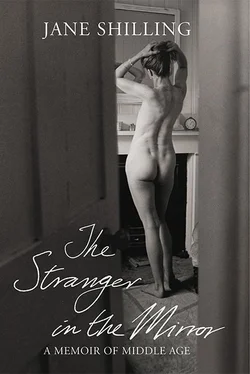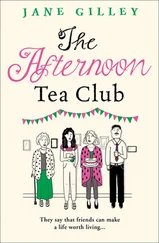Jewel-free, I turned up and was shown into the section editor’s office. She was a woman about a decade younger than me, dressed (I observed from force of habit) in a flirty skirt, a little cardigan and a pair of lace-trimmed leggings, the hems of which stopped at her bare mid-calves. I had worn footless tights when they were fashionable first time around, during the dancewear craze of the Eighties, but in those days we used to wear them like ballerinas at practice class, pulled down around our ankles.
Come in, come in, said the editor with great energy. Coffee? Tea? Biscuit? Really? A glass of water, then? I was writing a book about middle age, wasn’t I? Such a great subject; they would definitely want to consider it for extract. Such a fascinating time of life, middle age – so full of opportunity and change, didn’t I think? That was it. I was doomed.
I sat silently as she spoke on – time for change, don’t want you to vanish from our pages, always admired your writing, freelance opportunity, say ten pieces a year? I wonder, she said suddenly, if I ought to introduce you to Jonathan (the new overall editor and author of all this stimulating change). You’re such a good writer, I’m sure he’d love you.
For a moment, I thought I was saved. A painful sensation of relief began to break in my chest, like something tearing. But after a pause, she flapped the idea away with a graceful dismissing movement of her hand – maybe later, he’s so busy at the moment – and resumed the flow of talk: regular features meetings – do come! – three months’ notice…
I think my contract says a month, I said.
Really? Well, for goodness’ sake don’t tell the managing editor’s office that, she said with a complicit giggle. She got up. The meeting was over. She moved towards me, clasped me in her arms and kissed me. Afterwards the thing I really minded was that kiss. I wished I’d had the presence of mind to step away from it and flee with that scrap of my dignity intact. But I didn’t.
I emerged from the slab glass office with its chill artificial atmosphere of air conditioning into the spring sunlight and the roar of the city traffic. Towards Tower Bridge a blackbird was singing, perched among the sticky pale-green buds of a lime tree. I wanted very urgently to get home, to see my child, my garden, my cat; to be safe inside my front door, among my books.
It wasn’t until I was on the Docklands Railway, rattling over the flimsy concrete track that soared past the blackened brick slums and bald patches of waste ground of Shadwell and Deptford, past the glinting granite and steel of Canada Water and Canary Wharf, past Heron Quays (where no heron, I bet, had ever been seen), before plunging beneath the river to emerge at the safe familiarity of Cutty Sark, that it occurred to me that I wasn’t travelling away from danger towards safety.
Nowhere was safe now, for safety cost money and in three months from now (or one month, if the managing editor’s office took a glance at the relevant clause in my contract) I would have none. My home wasn’t mine unless I had the money to pay for it. There would be no food in the cupboard, no heat, no light, no water, no petrol in the car, for all these things cost money and suddenly I was earning none.
For twelve years I had written 1,000 words a week, 46 weeks a year. For all that time the shape of my week had been the same – the lovely empty expanse of Monday and Tuesday, filled with book reviews or other scraps of freelance writing; the pressure beginning to gather on Wednesday, a day spent sitting on the floor, scissors in hand, searching the crackling dross of four days’ worth of newspapers for the seed of an idea that would grow on Thursday morning into an essay. The horror of the conviction each Thursday that the magic wouldn’t work, the page would be blank, or that I’d write something, send it through to the subs, but that it would turn out to be gibberish, not thoughts arranged into an argument, just paragraphs of fragmentary nonsense, like dummy copy. Then the curious shame of Friday, when I could never bear to read what I had written, unless someone happened to say it was all right. After that, the breaking of the wave, the flat calm of the weekend, and the start of the process all over again.
I had grown to love the essay form; the diligent, schoolgirl satisfaction of pursuing an argument through three paragraphs of development to a sweet, ringing conclusion. I kept volumes of essays by my bed, studied Bacon and Montaigne, Johnson and Hazlitt, tried to copy their muscular concision, marvelling at the fact that there was no subject so inconsequential – Leigh Hunt on ‘Getting Up on Cold Mornings’ – that it could not be put to work in an essay; no experience whose anguish could not be assuaged by writing 1,000 words about it and filing them by midday on a Thursday. Until now.
Above all, I said to myself as the train trundled towards Greenwich, I must not frighten Alexander. I must tell him what has happened, and that life may be hard from now on, but I must tell him that we will be all right in the end, and I must believe it myself.
I managed it well enough until he went to bed that first evening, but then I was overcome with a sense of pure, scalding shame at my fecklessness, my failure to protect us against this (easily foreseeable, in fact inevitable, I now saw) disaster.
I started to call and text my friends to tell them what had happened, scribbled down their advice, phone numbers, emails of editors who might be willing to give me work, then mechanically prepared something to eat, drank several glasses of wine and eventually, with a curious, loose, rattling feeling inside, as though my chain had slipped its gears, went to bed and lay awake, dry-eyed and terrified, trying to think sensibly about what to do now.
At about 1.30 in the morning, the phone buzzed. It was a text from a friend, quoting Julian of Norwich: All shall be well, and all shall be well, and all manner of things shall be well . I felt as though I wanted to cry, but couldn’t.
The next day was a Saturday, when normally I would go to the stableyard to ride. There seemed no reason not to, although I knew that I shouldn’t be able to keep the mare for much longer. The whole of life had taken on a provisional quality, the limbo feeling of having left school and not yet started at college, or the selvedge of time between selling one house and moving into the next one.
It was a fine April day, a fuzz of green buds on the woods either side of the road, a robin hopping on the gatepost as I turned into the yard. I went up to the field where the mare was grazing and leaned against her for a long time, scratching her withers and breathing in the sweet, calm smell of her neck until she got bored and bit me. Then I brought her in and went over to the tack room for her saddle.
They had been working on the yard over the winter. The old wooden stables had gone and been replaced by smart, whitewashed breeze block. At the angle of the stable block there was a new tack room, almost finished, just waiting for the electric light to be connected. In front of the door was a tiny step. As I opened the door and stepped inside from the light to the dark, I tripped and half fell, catching the side of my brow on the breeze block. It didn’t hurt much, but as I stood up, blood started to pour from a cut above my eye.
I leaned against the whitewashed wall with blood dripping through my cupped hands and splashing on the whitewashed concrete at my feet, with a confused sense that this blow to the head was in some way connected to my lost job; that the blood pouring into my hands was my life, leaking away.
‘Are you all right?’ said someone, but I couldn’t put a coherent sentence together; I gazed stupidly at the crimson splashes of blood on the white breeze block and the ground and the little puddle of it in my hands, thinking dully that if only I could stop the bleeding, my life would be put back together, mended somehow, and then everything would be all right again.
Читать дальше












